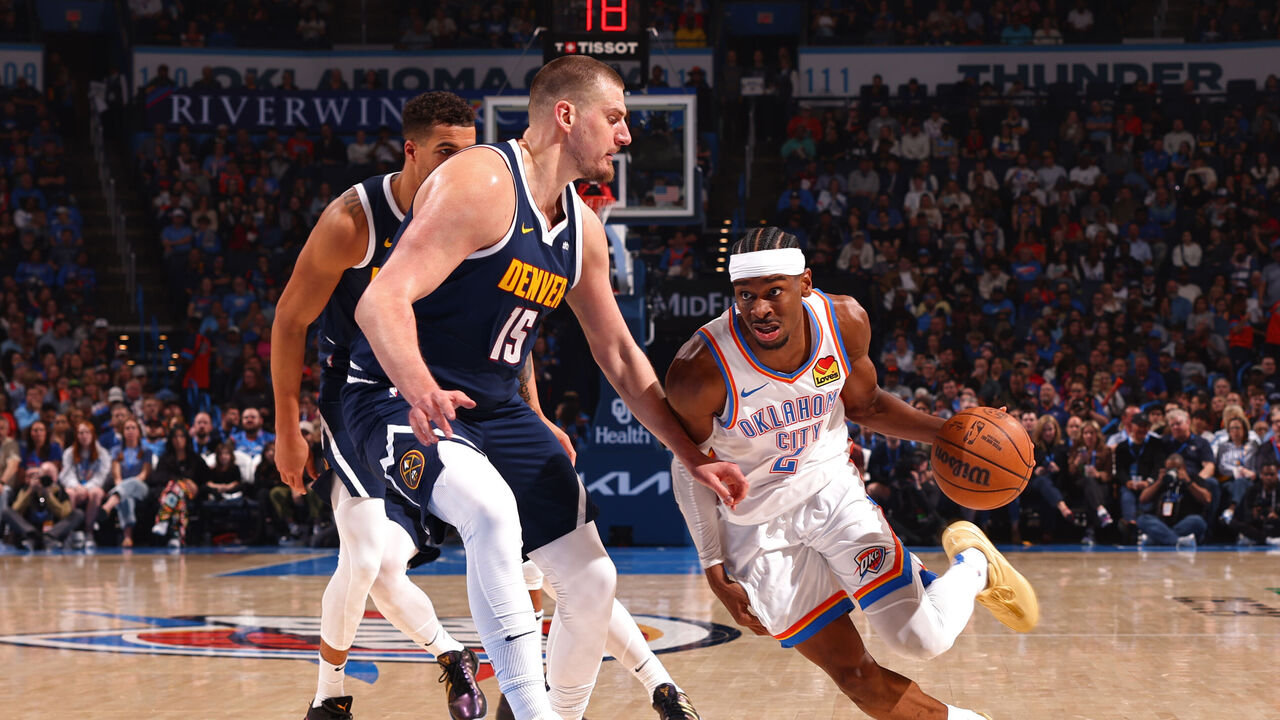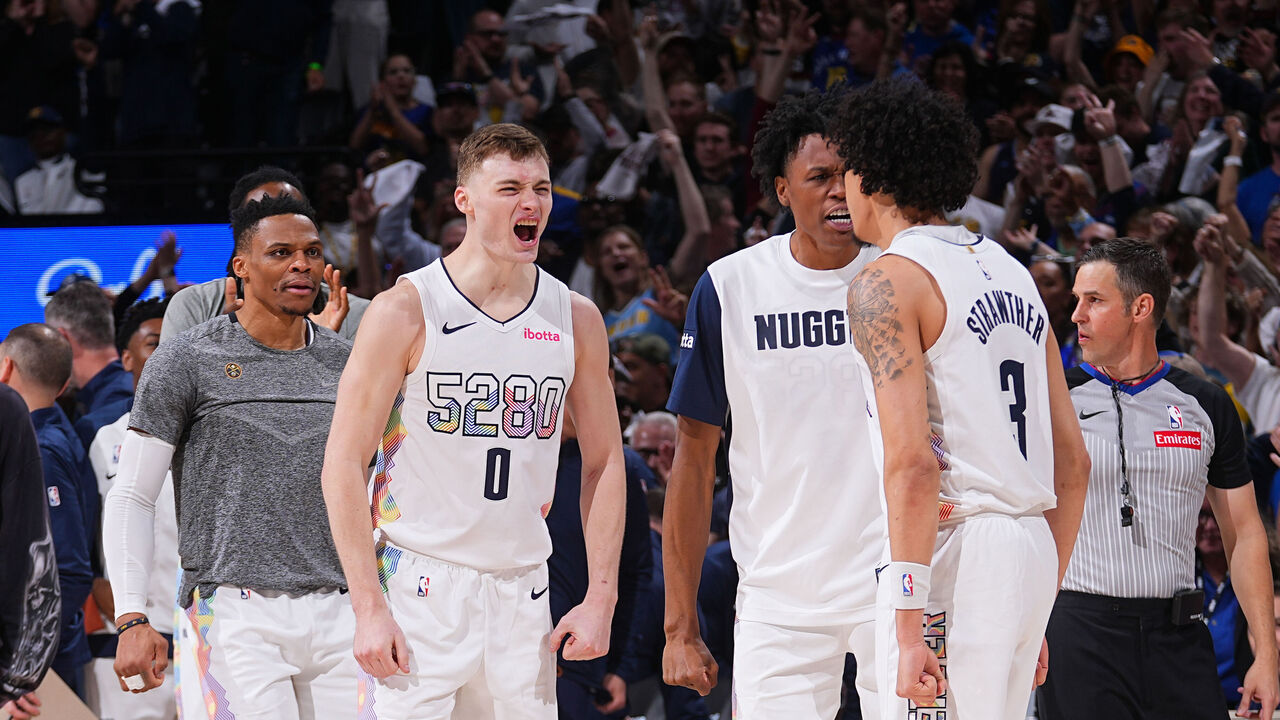5 burning questions ahead of Thunder-Nuggets Game 7
The Denver Nuggets' win over the Oklahoma City Thunder in Game 6 on Thursday pushed the second round's best series the distance. Game 7 in OKC on Sunday will be the biggest game of the postseason so far and the biggest test yet for this exceptional young Thunder core. Here are five questions whose answers will determine how the momentous contest shakes out.
What's left to throw at Jokic?
The Nuggets' biggest advantage in this win-or-go-home contest is that they have the best player - in this or any matchup - in Nikola Jokic. The Thunder, though, are one of the best defensive teams in modern NBA history and for about four games managed to give Jokic all he could handle.
They threw everything including the kitchen sink at him, toggling individual matchups, mixing up pick-and-roll coverages, and scrambling his post reads with omni-directional stunts and double-teams. Jokic had a monster Game 1, but after that, OKC learned not to let him attack Chet Holmgren without another big man on the floor, be it Isaiah Hartenstein or Jaylin Williams. Over the next three games, Jokic shot 33% from the field. Through Game 4, he had more turnovers in the series (23) than assists (21).
It was a different story in Games 5 and 6, as Jokic digested the coverages he was seeing (like he always does) and figured out how to attack them. The doubles stopped flustering him. He started attacking more from the top of the floor as a driver and pick-and-roll ball-handler. He started running more four-five action with Aaron Gordon, drawing both Thunder bigs away from the basket. (OKC ultimately tried to negate this by putting Holmgren on a wing instead.) Jokic scored 73 points on 26-of-39 shooting with just three total turnovers across the two games. This series might have been over already if his teammates had managed to convert more than five of his 20 potential assists into points in Game 5.
Now the Thunder must figure out how to once again unsettle the genius who's gotten all too comfortable against their pressure. OKC's defense possesses a deep bag of tricks, and it'll have to burn through the whole thing in order to keep Jokic at bay in Game 7.
Can OKC solve Denver's zone?

At the other end of the floor, the Nuggets have stuck to a pretty clear formula when jamming up OKC's offense. They've played zone on 19.2% of their defensive possessions, including 28.6% over the last three games, according to Synergy. For reference, the Heat had the highest zone usage during the regular season at 13.9%, and the Nuggets used it just 4.1% of the time.
The zone benefits Denver by keeping Jokic from having to directly guard ball-screen action, but it's also tailored to crowd Shai Gilgeous-Alexander's airspace, especially in the middle of the floor. The defensive shell bends and moves with him, with a second defender shading over anytime he touches the ball. The Nuggets are more than willing to concede shots to role players like Lu Dort, Alex Caruso, Cason Wallace, and Aaron Wiggins if it means curtailing Gilgeous-Alexander's drives at the free-throw line.
It's worked like a charm; the Thunder, who typically average about 1.05 points per half-court possession, have seen that number dip to 0.92 points on possessions against zone this series, per Synergy. That's the biggest reason the Nuggets' 21st-ranked regular-season defense has managed to hold the league's third-ranked offense 7.4 points per 100 possessions below its usual standard despite conceding 149 points in Game 2. Another indicator of how well it's working: OKC's driving the ball five fewer times per game than it did during the regular season, and it's converting those drives into points at a rate of just 48.5% (the lowest mark of any second-round team) compared to 60.3% during the season, per NBA Advanced Stats.
The Thunder have applied all the conventional screen-the-zone counters, but because of their 3-point struggles (32.6% in the series) they haven't come up with a real solution other than attacking fast enough to prevent Denver from establishing the zone to begin with. Much of their fate in Game 7 rests on their ability to crack that coverage.
Is J-Dub ready for this?
Considering the way Gilgeous-Alexander is being guarded, and how desperate the Thunder have been for any kind of supplemental scoring or on-ball creation punch, you could make a strong argument that Jalen Williams has been the most disappointing player of the second round. His defense has remained extremely strong, which has been a vital ingredient in OKC's wins, but offensively he's looked completely lost and unprepared to meet the moment.
He's struggled to figure out how to puncture the aforementioned zone, seems to have lost all confidence in his jumper, and can't locate his touch around the basket. He's shooting 40% from 2-point range (including 41% at the rim) and 21% from deep in the series. Things reached a nadir in Game 6, when he shot 3-of-16 and missed his last 10 field-goal attempts - many of which were either open threes or point-blank looks.
There are a lot of reasons OKC hasn't looked like the same team that tore through the regular season (many of which have to do with Denver), but the biggest reason by far is that its second-best player can't put the ball in the basket. Gilgeous-Alexander has struggled with his jumper at points but has mostly pulled his weight. Holmgren had a tough start to the series but has steadily improved as it's gone along. Williams is the guy who most needs to rise to the occasion in Game 7. If he can't, there's a good chance the Thunder will be cleaning out their lockers Monday.
Do the Nuggets have enough bodies?

OKC had the clear depth advantage in this matchup even before injuries and illness started to further tax Denver's shallow rotation. Michael Porter Jr. has been playing through a shoulder sprain that's completely squashed his most important skill; he's shooting 28% from three and 33% on mid-rangers in the series, and as a result has played fewer than 30 minutes in four of the six games. Making matters worse, Aaron Gordon, who's been a monster at both ends of the floor this postseason, tweaked his hamstring late in Game 6.
The Nuggets' bench has been a liability all year, so the team isn't really built to sustain this kind of attrition to its starting unit. In Game 5, a desperate David Adelman opted to play both Jokic and Jamal Murray the entire fourth quarter instead of getting them their customary staggered rest, and while Jokic almost made the gamble pay off, Murray ran out of gas down the stretch. In Game 6, Denver got performances from Christian Braun and Julian Strawther that were tantamount to manna from heaven.
With Gordon struggling, Braun - who had single-digit scoring outputs in three of the first five games of the series - stepped up with 23 points on 8-of-14 shooting to go along with 11 rebounds, five assists, and three steals. Strawther came off the bench and chipped in 15 points, which was more than he scored in Games 1-5 combined. Adelman gave him a bunch of Porter's minutes, and his flurry at the end of the third quarter turned out to be arguably the most important stretch of the game; it gave the Nuggets some separation and bought Jokic a few minutes of rest to start the fourth.
The odds of Denver getting contributions like that from those guys in Game 7 are slim, but there aren't many other places to turn. Russell Westbrook and Peyton Watson will bring energy and make big plays on defense, but their shooting woes make them major offensive liabilities. They combined to shoot 4-of-15 and were the only Nuggets with negative net ratings in Game 6. One way or another, someone outside the team's core three will have to step up, especially if Gordon is hampered in any way. As great as Jokic and Murray are, even they can't overcome a team as deep and talented as OKC without significant help.
Who wins the possession battle?
The Thunder produced the greatest turnover differential of all time this season (plus-5.3 per game), and they've showcased that aspect of their identity in this series. Through six games, they've committed 33 fewer turnovers than Denver has. The Nuggets have made up for some of that with their offensive rebounding advantage, but OKC still holds a significant edge in shooting possessions.
That said, the last three games marked a significant shift. With Denver - and especially Jokic - getting their turnovers under control, the possession battle has been played to a virtual draw. Considering how much the Thunder have struggled to score against Denver's set defense, it's imperative for the Nuggets to continue that recent trend of ball retention to mute their opponents' transition attack. On the other side, OKC must control the defensive glass and limit extra chances for a Denver team with an 88.5 offensive rating on first-shot half-court possessions.
This has become a critical battleground across the NBA in recent years, and it's going to have a huge hand in determining which of these teams advances to the West finals.
Joe Wolfond writes about the NBA for theScore.